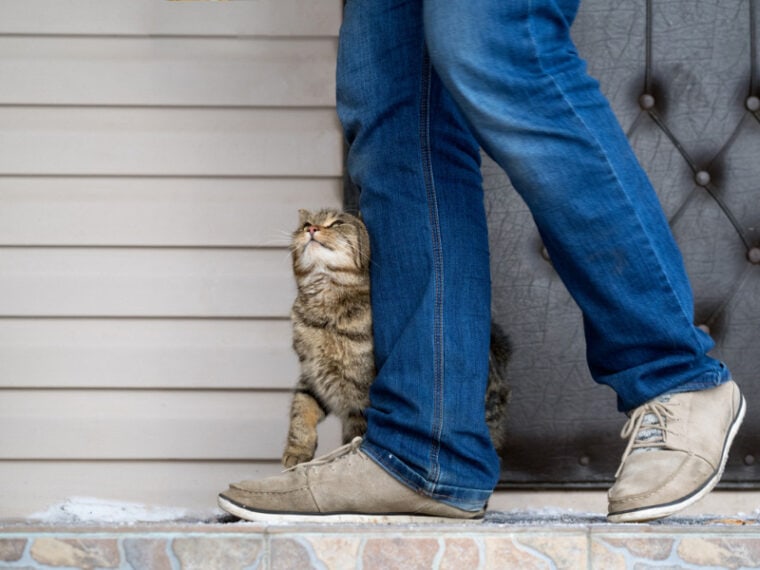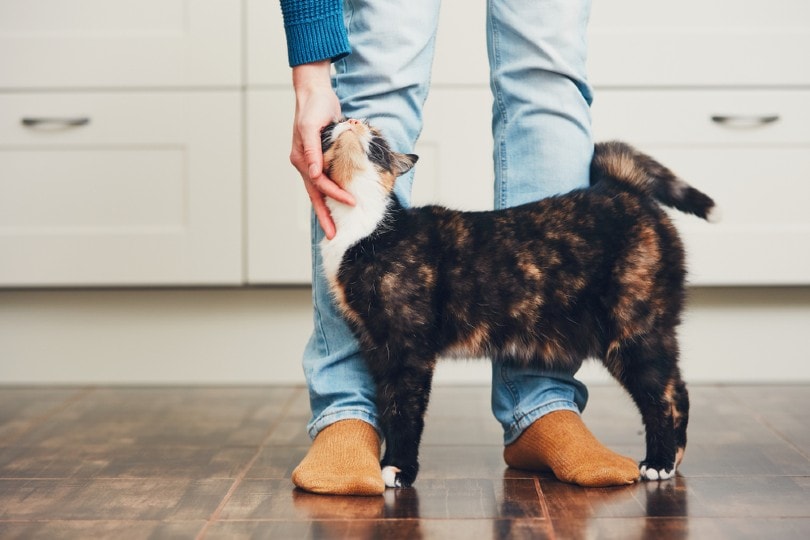
All cat owners are aware of the cat headbutt. It’s a daily occurrence with most cats, but some are gentler with their headbutting than others. Whether you think the behavior is endearing or annoying, you may not understand why felines do it. Before we examine the reasons, it’s vital to determine if your cat is headbutting or head pressing.
If they’re pressing their heads against a wall or corner and seem anxious or unhappy, they’re probably displaying head pressing and must be examined by a veterinarian. In contrast, cats that headbutt their owners or other objects seem happy and energized, and they’re often purring. Cats usually headbutt their owners as a way of rubbing their pheromones on them. Keep reading as we explain further.
Why Does My Cat Headbutt Me?

As with many strange feline behaviors, the answer to this question is pheromones. Cats have glands in several areas of their body, including right in front of their ears. Their glands produce pheromones that act as a kind of scent communication, and when headbutting you, your cat is rubbing the pheromones on you. The same is true of when they rub their cheeks on you.
You aren’t the only thing your cat is marking with pheromones either; they also mark items they care about or enjoy. Your cat may headbutt or rub their face against items like your couch, bed, table, or scratching post. Interestingly enough, cats also rub against people and objects they know very little about as a way to test them and figure out what they are.
How Does Headbutting Benefit Cats?
It’s important to note that the pheromones are not to mark their territory to keep other cats away; they spray to accomplish that.
A Sense of Security
It’s like when you move into a new house and redecorate to personalize it. You might hang paintings or repaint the walls while your cat rubs their pheromones on the furniture. It makes them feel safe when they can walk around their territory and detect their scent.
They’ll rub their heads and cheeks on you and the areas where they spend the most time. Unfortunately, you may even see your cat rub against the toilet when you’re in the bathroom!
Strengthening Their Bond
If a cat headbutts you, they consider you part of their pack, for lack of a better word. They view you as family and want you to smell like family; much of the cat’s communication is based on smell. While this does nothing for us, since we can’t smell these pheromones, it helps your cat bond to you and reassures them. It is also why you might see two cats headbutting each other; they’re communicating and mixing their scent.

Seeking Attention
Another reason your cat headbutts you is for attention. They may want to play a game or curl up in your lap for a nap. If you’re working on your computer at home and missed their dinner by a few minutes, they may headbutt your legs or chair to remind you they’re hungry. Although some energetic cats can almost seem aggressive with their headbutts, it’s an affectionate behavior that proves your feline adores you.
Closing Thoughts
Now you know why your cat headbutts you and your belongings. Whether they’re doing it as a sign of affection, to make themselves feel at home, or to gain your attention, it’s an endearing act that proves cats are more emotional than some give them credit for. Next time your cat walks up and gives you a headbutt, show them you understand by petting them and taking a break to spend time with them. You might just make their day!
Featured Image Credit: Irina Kozorog, Shutterstock






